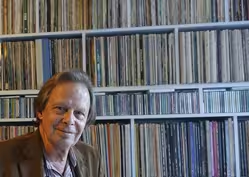
Why this famous New York food critic is moving on
Clip: 11/29/2024 | 5m 35sVideo has Closed Captions
'I needed to eat a little more sanely' : Why this famous New York food critic is moving on
There are many ways we define American culture: the music, art and literature we produce, how our politics plays out, but also: the food we eat, and where we choose to eat it. In New York City in particular, each bite has chronicled that slice of America. But now, after countless restaurants and hundreds of reviews, Pete Wells is moving on from his job as the New York Times restaurant critic.
Problems playing video? | Closed Captioning Feedback
Problems playing video? | Closed Captioning Feedback
Major corporate funding for the PBS News Hour is provided by BDO, BNSF, Consumer Cellular, American Cruise Lines, and Raymond James. Funding for the PBS NewsHour Weekend is provided by...

Why this famous New York food critic is moving on
Clip: 11/29/2024 | 5m 35sVideo has Closed Captions
There are many ways we define American culture: the music, art and literature we produce, how our politics plays out, but also: the food we eat, and where we choose to eat it. In New York City in particular, each bite has chronicled that slice of America. But now, after countless restaurants and hundreds of reviews, Pete Wells is moving on from his job as the New York Times restaurant critic.
Problems playing video? | Closed Captioning Feedback
How to Watch PBS News Hour
PBS News Hour is available to stream on pbs.org and the free PBS App, available on iPhone, Apple TV, Android TV, Android smartphones, Amazon Fire TV, Amazon Fire Tablet, Roku, Samsung Smart TV, and Vizio.
Providing Support for PBS.org
Learn Moreabout PBS online sponsorshipWILLIAM BRANGHAM: There are many ways that we define American culture, the music, art, and literature we produce, how our politics plays out, but also the food we eat and where we choose to eat it.
And my next guest has been chronicling that slice of America in New York City in particular for over a decade.
But now, after countless restaurants and hundreds of reviews, Pete Wells is moving on from his job as The New York Times restaurant critic.
In a parting column, he wrote -- quote -- "A funny thing happened when I got to the end of all that eating.
I realized I wasn't hungry, and I'm still not, at least not the way I used to be."
And Pete Wells joins us now.
Pete Wells, such an honor to have you on the program.
Your reviews and guides to eating have been critical, obviously, for New Yorkers, but for people who come to the city and want to experience its bounty.
How has it felt for you since you sort of hung up your pen and pad in the last few months?
PETE WELLS, The New York Times: Well, it's -- I have real mixed emotions.
I mean, I'm really glad to be staying home at night, almost every night, and eating maybe a vegetable or something, you know?
PETE WELLS: And when I hear when you say people are looking for guidance when they come to the city, I think, oh, oh, I have got something to say about that.
So, it's a little bit hard to.
But I don't miss the routine, but I do kind of miss having the megaphone.
I'd like to be broadcasting my thoughts once in a while, maybe not every week.
(LAUGHTER) WILLIAM BRANGHAM: I get that.
For those who didn't read your last column, could you explain why you left?
Because, again, to people on the outside, you had what is arguably one of the great all-time jobs, to search out the new and the best restaurants in New York City and write about them and bring them to the masses.
So why'd you step aside?
PETE WELLS: It is a great job.
I really, really loved it.
I had a conversation with my doctor that was very serious and unwelcome at first.
And then I just realized that I needed to become a healthier person.
And if I stayed on the restaurant beat, maybe I could do it through enormous discipline.
But I don't even have a little discipline.
I have zero discipline.
So I just -- I needed to eat a little more sanely.
And that's one thing a restaurant critic can't do.
WILLIAM BRANGHAM: One of the pieces that you wrote looked at how New York City is going through this process for code reasons, basically taking down those sheds that became ubiquitous, outdoor dining sheds across New York City.
And I understand the code violations that the city is arguing as to why they need to take them down.
But it also seems like something precious is being lost.
New Yorkers got a chance to eat outside in a way that they never had before.
And I wonder what you think about that.
PETE WELLS: I agree that something's being lost.
Sitting out on the pavement in what had been parking spaces, that was totally new.
And that was amazing, I think.
I loved a lot of the structures.
Some of them were a complete mess, but a lot of the restauranteurs really put love and care into them to make them into something that was contributing to the street life, contributing to the neighborhood.
And then they -- I came to love the experience of eating out in the cold weather, which, at first, I thought like, oh, who wants to sit in a parka and eat a salad?
But as time went on, I really fell in love with that whole experience, just being in a little house on the street with a space heater and a speaker playing the restaurant's playlist.
I thought that was a wonderful experience.
WILLIAM BRANGHAM: What do you hope that people take away from restaurant criticism?
How have you seen this -- your job over the last 12 years?
PETE WELLS: I came to see it more and more as sort of an ongoing sketch of the city and what New York City had to offer, who New York City fed and who came to New York City, and the different reasons people come to New York City, from the chefs who want to become world-famous, and then the chefs who had no ideas of fame and just wanted to feed a community.
Maybe it was the Thai community in Woodside, or maybe it was just people who lived five or six or seven blocks away, but they would still pour their hearts into it, and everything in between that.
And I just came to find that so interesting, because it encapsulates something about New York, that it's a magnet for all kinds of reasons.
People may come here for a better job, for a better life.
And some people come here to write their name on the big wall for everybody to see.
And that, to me, somewhere in the mix of that is what makes the city great.
WILLIAM BRANGHAM: Pete Wells, we are all going to miss reading your reviews in The New York Times, but look forward to whatever you do next at the paper.
So great to have you on the program.
Thank you.
PETE WELLS: Thank you.
Brooks and Capehart on Trump's federal case dismissals
Video has Closed Captions
Clip: 11/29/2024 | 10m 50s | Brooks and Capehart on the dismissal of Trump's federal cases (10m 50s)
New book explores global influences on Western pop music
Video has Closed Captions
Clip: 11/29/2024 | 6m 53s | New book explores roots of Western pop music and global influences that shaped it (6m 53s)
Paris's Notre Dame Cathedral set to make a comeback
Video has Closed Captions
Clip: 11/29/2024 | 9m 4s | Notre Dame Cathedral to reopen 5 years after devastating fire (9m 4s)
Reflecting on Rafael Nadal's storied career in tennis
Video has Closed Captions
Clip: 11/29/2024 | 7m 37s | End of an era: Reflecting on Rafael Nadal's storied career in tennis (7m 37s)
Thousands protest in Georgia after government kills EU bid
Video has Closed Captions
Clip: 11/29/2024 | 5m 39s | Thousands protest in Georgia after government suspends EU bid (5m 39s)
Providing Support for PBS.org
Learn Moreabout PBS online sponsorship
- News and Public Affairs

FRONTLINE is investigative journalism that questions, explains and changes our world.

- News and Public Affairs

Amanpour and Company features conversations with leaders and decision makers.
Urban Consulate Presents











Support for PBS provided by:
Major corporate funding for the PBS News Hour is provided by BDO, BNSF, Consumer Cellular, American Cruise Lines, and Raymond James. Funding for the PBS NewsHour Weekend is provided by...





